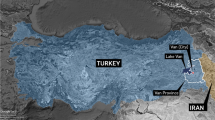Abstract
The chapter will analyse the problems and issues of the people residing in the border villages of Punjab. The term ‘border village’ is used for those villages which are located on the zero line, i.e. Radcliffe Line, which divides India and Pakistan border.
Access this chapter
Tax calculation will be finalised at checkout
Purchases are for personal use only
Similar content being viewed by others
References
Bakshi, Sumita. 2008. Policing the Borders. Journal of Political Science 4 (1).
Butalia, Urvashi. 2017. On the Other Side of Silence: Voices from the Partition of India. Penguin.
Canefe, Nargis. 2019. Borders, Citizens and Subaltern in South Asia. In Deterritorialised Identity and Transborder Movement in South Asia, ed. Nasir Uddin and Nasreen Chaudhary. Singapore: Springer.
Chandra, Bipin, Mridula Mukerjee, and Aditiya Mukerjee. 2000. India After Independence. New Delhi: Viking.
Chandran, D. Suba, and P.G. Rajmohan. 2007. Soft, Porous or Rigid? Towards Stable Borders in South Asia. South Asian Survey 14 (1): 117–128.
Datta, V.N. 2002. Lord Mountbatten and the Punjab Boundary Commission Award. In Pangs of Partition, ed. S. Settar and I.B. Gupta. New Delhi: Manohar Publishers.
Fall, Juliet. 2005. Drawing the Line. Boundaries, Identity and Hybridity in Transboundary Spaces. Aldershot: Ashgate.
Government of India. (2015–2016). ‘State Industrial Profile of Punjab‘, Ludhiana: Ministry of MSME.
ICSSR Project. 2009. Problems of Border Area Farmers in Punjab: An Empirical Study. Department of Political Science, Guru Nanak Dev University, Amritsar.
Jaiswar, P.K. 2018. ‘Cross-Border Drug Trafficker Change Policy to Dodge BSF Men’. The Tribune News Service, October 28.
Lal, Brij V. 2006. The Encyclopaedia of the Indian Diaspora. Singapore: Didler Miller.
Mangat, Harpreet Kaur. 2010. Baptism by Fire, Survival by Grit: Life in the Border-Belt of Punjab. Guru Nanak Journal of Sociology 31 (1/2): 19–36.
———. 2016. Maximum Security and Minimum Development-the Irony and Paradox of Living at Indo-Pak Border. In Life on the Indo-Pak Border: A Paradox of Security and Development, ed. Sukhdev Singh Sohal and Anjali Mehra, 41–56. New Delhi: Serial Publications.
Paul, G.S. 2018. ‘4 Held with Heroin Worth Rs. 120 Crore’. The Tribune News Service, October 28.
Puri, H.K., P.S. Judge, and J.S. Sekhon. 1999. Terrorism in Punjab: Understanding Grassroots Reality. New Delhi: Har-Anand Publishers.
Rajan, Irudaya S., and Aswini Kumar Nanda. 2015. Transnational World and Indian Punjab: Contemporary Issues. In Migration, Mobility and Multiple Affiliations, ed. S. Irudaya Rajan, V.J. Varghese, and Aswini Kumar Nanda. Delhi: Cambridge University Press.
Randhawa, M.S. 1954. Out of Ashes: An Account of Rehabilitation of Refugees from West Pakistan in the Rural Areas of East Punjab. Delhi: OUP.
Randhawa. 2009. Interview with Rattan Singh Randhawa, Leader of Farmers in the Border Belt of Punjab, November 14.
Sekhon, Jagrup Singh. 1999. Migration Due to Terrorist Violence in Punjab: A Study. Punjab Journal of Politics XXIII (2).
———. 2011. Unpublished ICSSR Project Report Problems of Border Area Farmers in Punjab: An Empirical Study. Department of Political Science, Guru Nanak Dev University, Amritsar.
———. 2013. Life at the Cutting Edge: Experiences of Living in Border Areas. Man & Development XXXV (3): 57–70.
———. 2014. Farmers at the Borderbelt of Punjab: Fencing and Forced Deprivation. In Mapping Social Exclusion in India: Caste, Religion and Borderlands, ed. Paramjit S. Judge, 237–252. Delhi: Cambridge University Press.
———. 2015. Social Transformation of Peasantry in the Border Belt of Punjab: A Study. In Crises in Social Transformation in India, ed. S.R. Ahlawat and Neerja Ahlawat, 151–161. Jaipur: Rawat.
Sekhon, Jagrup Singh, and Sunayana Sharma. 2019. Involuntary Migration in the Border Belt of Indian Punjab. In Deterritorialised Identity and Transborder Movement in South Asia, ed. Nasir Uddin and Nasreen Chaowdhory. Singapore: Springer.
Singh, Arsal. March 8, 2010. Interview with Arsal Singh a Prominent Leader of the Farmers in the Border Area Fighting for Justice to the Residents of Zero-Line Villages.
Singh, Kesar, and U.S. Rangnekar. 2010. A Profile Report on Pre-Project Survey of Border Area Development Programmes in Punjab. Chandigarh: Department of Planning, Government of Punjab.
Szary, Anne-Laure Amilhat. 2015. Boundaries and Borders: Handbook of Political Geography, 13–25. Wiley-Blackwell. 978-1-118-72588-7.
Uddin, Nasir. 2019. The State, Transborder Movements, and Deterritorialised Identity in South Asia. In Deterritorialised Identity and Transborder Movement in South Asia, ed. Nasir Uddin and Nasreen Chaudhary. Singapore: Springer.
Author information
Authors and Affiliations
Editor information
Editors and Affiliations
Rights and permissions
Copyright information
© 2022 The Author(s), under exclusive license to Springer Nature Singapore Pte Ltd.
About this chapter
Cite this chapter
Sekhon, J.S., Sharma, S. (2022). The Legacy of Partition and Structural Victimisation of the People of Borderland: A Case of Punjab. In: Chowdhory, N., Banerjee, P. (eds) Gender, Identity and Migration in India. Palgrave Macmillan, Singapore. https://doi.org/10.1007/978-981-16-5598-2_13
Download citation
DOI: https://doi.org/10.1007/978-981-16-5598-2_13
Published:
Publisher Name: Palgrave Macmillan, Singapore
Print ISBN: 978-981-16-5597-5
Online ISBN: 978-981-16-5598-2
eBook Packages: Social SciencesSocial Sciences (R0)




